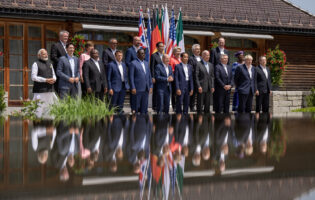The G20 Summit in Korea
On November 16, 2010, AGI hosted a seminar on “The G20 Summit in Korea: German and European Perspectives on International Economic Cooperation and IMF Governance Reform,” generously sponsored by the German Academic Exchange Service (DAAD). During this seminar, Ms. Katharina Gnath, a current DAAD/AGI Fellow, discussed the implications of the Seoul G20 summit for Germany and Europe. Ms. Gnath began by outlining the key results of the summit and then turned to a discussion of the implications of the coordination framework established by the G20.
Reform of the International Monetary Fund (IMF) was high on the agenda at the G20 summit; first, the summit participants endorsed the IMF governance reform that was negotiated by the G20 finance ministers prior to the leaders’ summit. The reform includes a quota shift of more than 6 percent, reducing European allocation of shares in favor of emerging market countries. It was further agreed that advanced European countries would give up two seats on the IMF’s Executive Board. Moreover, the summit endorsed Basel III, a new global framework for financial regulation, which had been negotiated by the Basel Committee.
Another important item on the summit’s agenda included global imbalances and the dangers of a competitive currency devaluation (or a “currency war”). The IMF was mandated to monitor excessive imbalances more closely in the future. Yet, the underlying problems of global imbalances remained unresolved at the summit. Finally, the South Korean G20 presidency introduced the themes of global safety nets and development for the group’s future agenda.
After being upgraded from the ministerial level to the executive level in 2008, the structures of the G20 are still not fully united. When measuring the success of the forum, Ms. Gnath maintained that it is important to understand that the G20 is neither a decision-making body nor a standard-setter. The informal forum, rather, has to be seen as setting the global economic policy agenda at the highest political level and providing deadlines for other organizations to work out the technical details. Overall, the G20 summits are part of a concert of governance institutions and can only been seen as the “tip of the iceberg” of broader governance processes. For example, while the reforms that led to Basel III were initiated by the G20, the actual details of implementation were carried out in the framework of standard-setting bodies such as the Basel-based Banking Committee on Banking Supervision.
During the discussion that followed, the issue of the G20’s legitimacy was brought up for debate, as well as more general questions on the composition and working processes of the G20. Although the lack of legitimacy was acknowledged by Ms. Gnath, she stressed that the G20 was not an official institution and added that too many participants would paralyze the process of finding consensus. As for the possibility of opening up the G20 forum for expert talks on issues such as climate change, Ms. Gnath did not see that as likely, since the underlying idea of the G20 was to form a body that could actually make agreements by not getting too much into details. Finally, Ms. Gnath commented on the agenda of the 2011 French G20 presidency, which will most likely include a continued focus on the international monetary system as well as development issues.







